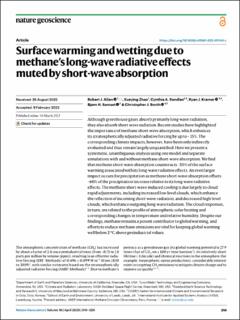| dc.contributor.author | Allen, Robert J. | |
| dc.contributor.author | Zhao, Xueying | |
| dc.contributor.author | Randles, Cynthia A. | |
| dc.contributor.author | Kramer, Ryan J. | |
| dc.contributor.author | Samset, Bjørn Hallvard | |
| dc.contributor.author | Smith, Christopher J. | |
| dc.date.accessioned | 2024-02-22T13:23:24Z | |
| dc.date.available | 2024-02-22T13:23:24Z | |
| dc.date.created | 2023-05-09T13:05:24Z | |
| dc.date.issued | 2023 | |
| dc.identifier.citation | Nature Geoscience. 2023, 16 (4), 314-320. | en_US |
| dc.identifier.issn | 1752-0894 | |
| dc.identifier.uri | https://hdl.handle.net/11250/3119402 | |
| dc.description.abstract | Although greenhouse gases absorb primarily long-wave radiation, they also absorb short-wave radiation. Recent studies have highlighted the importance of methane short-wave absorption, which enhances its stratospherically adjusted radiative forcing by up to ~ 15%. The corresponding climate impacts, however, have been only indirectly evaluated and thus remain largely unquantifed. Here we present a systematic, unambiguous analysis using one model and separate simulations with and without methane short-wave absorption. We find that methane short-wave absorption counteracts ~30% of the surface warming associated with its long-wave radiative effects. An even larger impact occurs for precipitation as methane short-wave absorption ofsets ~60% of the precipitation increase relative to its long-wave radiative efects. The methane short-wave-induced cooling is due largely to cloud rapid adjustments, including increased low-level clouds, which enhance the refection of incoming short-wave radiation, and decreased high-level clouds, which enhance outgoing long-wave radiation. The cloud responses, in turn, are related to the profile of atmospheric solar heating and corresponding changes in temperature and relative humidity. Despite our findings, methane remains a potent contributor to global warming, and efforts to reduce methane emissions are vital for keeping global warming well below 2 °C above preindustrial values. | en_US |
| dc.language.iso | eng | en_US |
| dc.publisher | Springer Nature ltd | en_US |
| dc.rights | Navngivelse 4.0 Internasjonal | * |
| dc.rights.uri | http://creativecommons.org/licenses/by/4.0/deed.no | * |
| dc.title | Surface warming and wetting due to methane’s long-wave radiative effects muted by short-wave absorption | en_US |
| dc.title.alternative | Surface warming and wetting due to methane’s long-wave radiative effects muted by short-wave absorption | en_US |
| dc.type | Peer reviewed | en_US |
| dc.type | Journal article | en_US |
| dc.description.version | publishedVersion | en_US |
| dc.source.pagenumber | 314-320 | en_US |
| dc.source.volume | 16 | en_US |
| dc.source.journal | Nature Geoscience | en_US |
| dc.source.issue | 4 | en_US |
| dc.identifier.doi | 10.1038/s41561-023-01144-z | |
| dc.identifier.cristin | 2146425 | |
| dc.relation.project | Norges forskningsråd: 324182 | en_US |
| cristin.ispublished | true | |
| cristin.fulltext | original | |
| cristin.qualitycode | 2 | |

